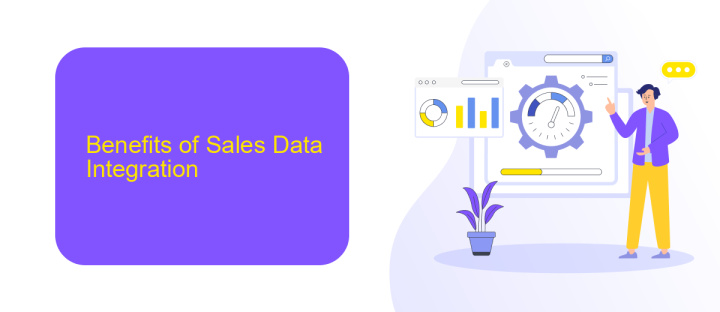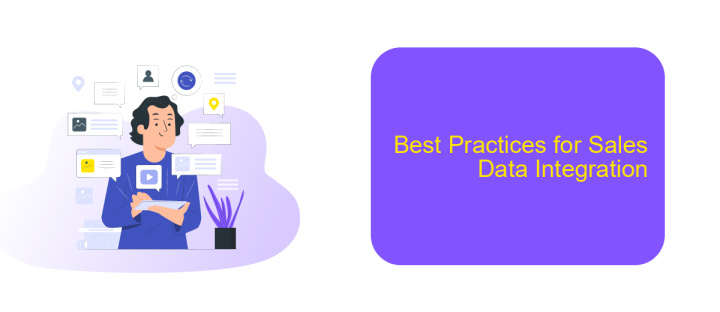Sales Data Integration
In today's competitive market, integrating sales data is crucial for businesses aiming to streamline operations and enhance decision-making. Effective sales data integration consolidates disparate data sources into a unified system, providing comprehensive insights and fostering data-driven strategies. This article explores the benefits, challenges, and best practices for achieving seamless sales data integration, empowering your organization to stay ahead in the ever-evolving business landscape.
Introduction
In today's fast-paced business environment, integrating sales data from various sources is crucial for making informed decisions and driving growth. Sales data integration involves combining data from multiple channels, such as CRM systems, e-commerce platforms, and marketing tools, into a unified view. This process helps organizations streamline their operations, enhance customer insights, and improve overall efficiency.
- Centralized data management
- Improved data accuracy
- Enhanced customer insights
- Streamlined operations
One of the key tools for achieving seamless sales data integration is ApiX-Drive. This service allows businesses to automate data transfers between various platforms without the need for complex coding. By leveraging ApiX-Drive, companies can ensure that their sales data is always up-to-date and accessible, enabling better decision-making and more effective sales strategies. As a result, organizations can focus more on growth and less on managing data silos.
Benefits of Sales Data Integration

Integrating sales data offers numerous advantages, including enhanced decision-making and improved efficiency. By consolidating data from various sources, businesses can gain a comprehensive view of their sales performance, identifying trends and opportunities that might otherwise go unnoticed. This holistic approach enables more accurate forecasting, better inventory management, and tailored marketing strategies, ultimately driving revenue growth.
Moreover, sales data integration streamlines operations by reducing manual data entry and minimizing errors. Tools like ApiX-Drive facilitate seamless integration between different platforms, allowing for real-time data synchronization and automated workflows. This not only saves time but also ensures that all team members have access to up-to-date information, fostering collaboration and informed decision-making. In turn, businesses can respond more quickly to market changes and customer needs, maintaining a competitive edge.
Challenges of Sales Data Integration

Integrating sales data from multiple sources presents numerous challenges that businesses must navigate to ensure seamless operations. These challenges can significantly impact the efficiency and accuracy of data-driven decision-making processes.
- Data Consistency: Different data sources may have varying formats, structures, and standards, leading to inconsistencies that complicate integration.
- Data Quality: Ensuring high-quality data is critical, as inaccurate or incomplete data can lead to poor business insights and decisions.
- Real-Time Integration: Synchronizing data in real-time across various platforms can be technically demanding and resource-intensive.
- Scalability: As businesses grow, the volume of sales data increases, requiring scalable solutions to handle the expanding data load efficiently.
- Security and Compliance: Integrating sales data involves handling sensitive information, necessitating robust security measures and compliance with regulations.
To address these challenges, businesses can leverage integration platforms like ApiX-Drive, which facilitate seamless data synchronization across multiple systems. ApiX-Drive offers automated workflows, ensuring data consistency and quality while providing scalable and secure solutions for real-time integration. By utilizing such services, companies can streamline their sales data processes, leading to more accurate and timely business insights.
Best Practices for Sales Data Integration

Effective sales data integration is crucial for optimizing business processes and ensuring accurate data flow between various platforms. To achieve seamless integration, it's essential to follow best practices that enhance data consistency and reliability.
Start by identifying the key data points that need to be integrated and ensure they are standardized across all systems. This will minimize errors and discrepancies during the integration process. Additionally, regularly updating and cleaning your data is vital to maintain its accuracy and relevance.
- Utilize a reliable integration service like ApiX-Drive to automate data transfers.
- Implement data validation rules to catch and correct errors early.
- Schedule regular audits to review and verify data integrity.
- Ensure compliance with data privacy regulations to protect sensitive information.
By adhering to these best practices, businesses can streamline their sales data integration processes, leading to more efficient operations and better decision-making. Leveraging tools like ApiX-Drive can further simplify and enhance the integration experience, allowing teams to focus on strategic initiatives rather than manual data management tasks.
- Automate the work of an online store or landing
- Empower through integration
- Don't spend money on programmers and integrators
- Save time by automating routine tasks
Conclusion
In conclusion, the integration of sales data is a critical component for enhancing business efficiency and decision-making. By consolidating data from various sources, companies can gain a comprehensive view of their sales performance, identify trends, and make informed strategic decisions. This process not only streamlines operations but also reduces the likelihood of errors that can occur with manual data handling.
Utilizing tools such as ApiX-Drive can significantly simplify the integration process. ApiX-Drive allows businesses to seamlessly connect different sales platforms, automate data transfer, and ensure that all information is up-to-date and accurate. By leveraging such services, companies can save time, reduce operational costs, and focus more on growth and customer satisfaction. Ultimately, effective sales data integration is indispensable for maintaining a competitive edge in today's dynamic market environment.
FAQ
What is Sales Data Integration?
Why is Sales Data Integration important?
What types of data can be integrated in Sales Data Integration?
How can I automate the integration of my sales data?
What challenges might I face during Sales Data Integration?
Apix-Drive is a simple and efficient system connector that will help you automate routine tasks and optimize business processes. You can save time and money, direct these resources to more important purposes. Test ApiX-Drive and make sure that this tool will relieve your employees and after 5 minutes of settings your business will start working faster.


